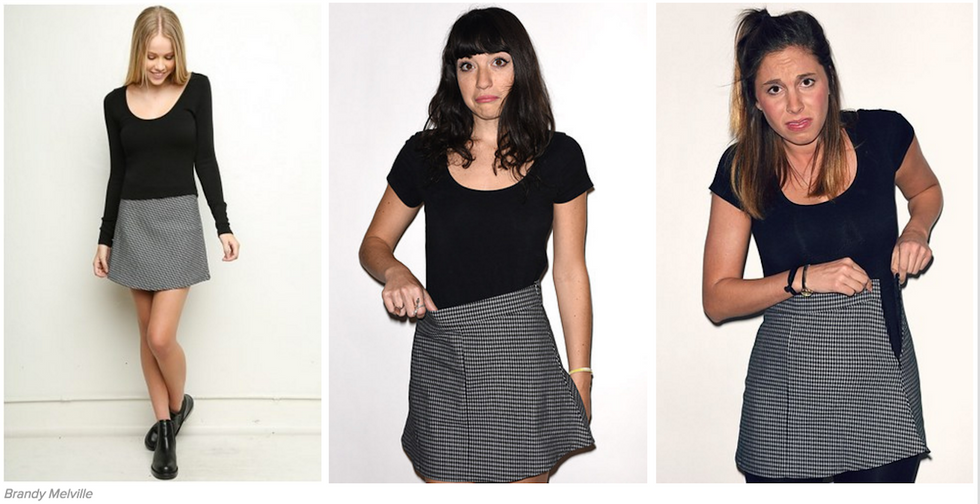The “one size fits most” motto of Los Angeles’s Brandy Melville is sending a message that is as universal as their sizes chart: you’re not normal.
The stores of Brandy Melville are lined with hundreds of clothing options – and they’re totally cute. From jeans to dresses to crop tops and sweaters, Brandy carries a boho, casual vibe at incredibly reasonable prices. In fact, their entire line could stock your wardrobe for pretty cheap, giving you both classic basics and those always-needed accent items – if you’re OS.
Most of the labels on their merchandise say “size small” or “one size,” with a few mediums popping up here and there. This “one size” mentality clearly sends messages to women far more expansive than the sizes on their label.
The jeans at the trending Brandy stores are created for a 25-inch waistline. This measurement calculates out to a U.S. 0-2. The average sized sixteen-year-old girl in the United States is approximately 5 feet 3 inches tall, weighing about 138 pounds, and has a waistline of about 31 inches. Brandy Melville is either targeting 12-year-olds or shouting from the top of the fashion industry what it means to be “normal” in today’s fashion world.
In the defense of Melville, the sign read when entering the room reads: one size fits most. Sure, they’re covering their bases but admitting that not absolutely everyone will find something flattering within their store’s walls, but they’re also conveying a message that: if you don’t fit, you’re not like most.
How horrifying of a statement to internalize. And not just at 16, but at any age.
Buzzfeed did a featured article on the Brandy brand, taking Brandy’s staple items and having girls of all different sizes try them on. They documented these girls, taking photos of them in each article of clothing, and the posting went viral. Most of the pieces were too small for women of a size 4/6 or higher, with the size 0 model either fitting perfectly into the item or swimming in the baggy clothing. The size 0 model makes a notable statement in the article, explaining how this brand speaks volumes to everyone, of all sizes.
We often think that the damage of such a business model would lie in telling girls that they too fat; the size 0 model in the article reminds us that insecurities come in all sizes – literally. If she “didn’t fit into the clothing because she was too small, [she] didn’t feel ‘normal.’” Whether the clothing misfit was because of extra fabric or not enough material, most articles created insecurities and body dissatisfactions.
There’s obviously no legal obligation for a brand to assume an inclusive approach in its marketing, but what about ethics? Well, ethics doesn’t always have a place in the size chart.
Lululemon – you know, the high-end brand for yoga clothing that everyone wears as everyday attire – received some serious criticism for their sizing and their CEO.
Former CEO and co-founder of Lululemon was interviewed in November of 2013 and was asked about the complained sheerness of the company’s classic yoga pants. He was quoted saying, “Frankly, some women’s bodies just don’t actually work [for the yoga pants].” The company produces sizes 0-12, and if you’re trying to avoid any kind of see-through fiasco, you better size up.
What is this telling women?
What message are we sending – not just to consumers – but to those who are unable to consume. It’s telling the 147 million women in the U.S. – and even more globally – that they aren’t normal. And there’s nothing normal (or healthy) about that.
These universal ideas of beauty have to be halted; there is no one size, face structure, or body type that spells out perfection. We’re damaging our psyches and putting ourselves through unattainable hell to fit into a mold – or a pair of jeans – that isn’t made for us.
I’m not encouraging you to stop shopping at your favorite stores, but I am encouraging you to consciously filter through the societal messages and validations that you do or don’t get on a regular basis, and make sure they're rooted in goodness and truth instead of skewed sizing or an expansive marketing ploy.
You’re worth more than that.

















